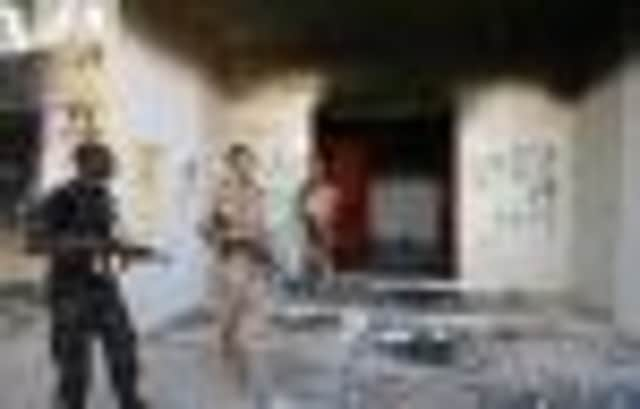Britons urged to evacuate Benghazi


Sources in Benghazi said UK and US authorities were expecting an attack similar to that on a gas plant which claimed the lives of dozens of hostages – including two Scots – in neighbouring Algeria last week.
The warning of a “specific threat” against westerners in Benghazi comes against the backdrop of the Algerian attack by Islamist extremists, which was said to be tied to French military action against al-Qaeda-linked militants in Mali.
Advertisement
Hide AdAdvertisement
Hide AdForeign Office minister David Lidington said the government had received “credible, serious and specific” reports about a terrorist threat and said the safety of British citizens in Libya was its “top priority”.
A Foreign Office spokesman said: “We are now aware of a specific and imminent threat to westerners in Benghazi, and urge any British nationals who remain there against our advice to leave immediately.
“We have updated our travel advice to reflect this. The British Embassy in Tripoli has been in contact with British nationals for whom we have contact details to alert them to the advice.”
It was not immediately clear how many people could be affected. The Foreign Office said it was likely dozens of British citizens were in the city. The British embassy in Tripoli said it had been in contact with a “small number” of UK nationals.
Last night, Germany also urged its nationals to leave Benghazi immediately, while the Netherlands advised Dutch nationals against staying.
However, Libyan officials condemned the evacuation warnings and demanded an explanation from the Foreign Office. One official said: “We are very surprised. It’s not rational at all.”
The warnings came a day after US secretary of state Hillary Clinton testified to Congress about a deadly September attack on the American consulate in Benghazi that killed four people, including the US ambassador to Libya.
The Foreign Office has been advising against travel to Benghazi and most parts of Libya since September. Local residents said many foreigners had left in recent weeks.
Advertisement
Hide AdAdvertisement
Hide AdYesterday, Air Malta said it was cancelling flights between the Mediterranean island and Benghazi.
Adel Mansouri, principal of the International School of Benghazi, said foreign nationals had been warned two days ago about a possible threat.
He said teachers were given the option of leaving but decided to stay. The school has some 540 students. Most are Libyan, with some 40 per cent who hold dual nationality. Less than 5 per cent are British.
“We told the British ambassador we are staying, and we’ll be in touch,” said Mr Mansouri, a Libyan-British dual national. “We don’t see a threat on the ground.”
Saleh Gawdat, a Benghazi politician, said French doctors who had been working in Benghazi hospitals had left the city and the French cultural centre had closed out of concerns about potential retaliation over the French-led intervention in Mali, which began two weeks ago.
Ibrahim Sahd, a Benghazi-based politician, said the new government was putting together a plan to beef up security in the city and this “might have worried the westerners of a backlash”.
Benghazi, a city of one million people, is a business hub where many major firms employ westerners. It was also where the Libyan uprising against Gaddafi began in 2011. Gaddafi was eventually toppled and killed after Nato backed the rebel movement, and the Arab country has since struggled with security. Al-Qaeda-linked militants operate in the country alongside other Islamist groups.
Violence in Benghazi has targeted both foreigners and Libyan officials in recent months.
Advertisement
Hide AdAdvertisement
Hide AdIn addition to the attack on the US consulate, an Italian diplomat’s car was fired on by militants in the city. The consul, Guido De Sanctis, was not injured.
Islamist extremists are often blamed for targeting security officials who worked under Gaddafi as revenge for being tortured or imprisoned in the past. Many city residents also blame Gaddafi loyalists, who they say are trying to undermine Libya’s new leaders by sowing violence.
But Noman Benotman, a former Libyan jihadist with links to al-Qaeda who is now an analyst at London’s Quilliam Foundation, said the militants were unlikely to target oil or gas installations in Libya because they needed support from the local population.